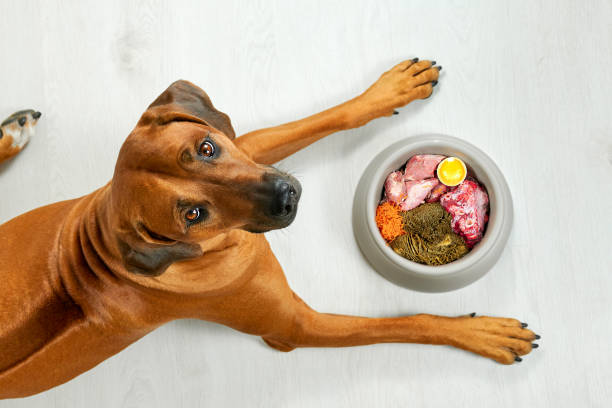
Raw Dog Food Diets: The Complete Guide for Pet Parents
Share
If you've spent any time on social media lately, you've probably seen those viral TikTok videos of dogs devouring colorful bowls of raw meat, organs, and bones. The hashtags #RawFedDog and #BARFDiet are everywhere, with pet parents sharing dramatic before-and-after transformations of their furry friends. But beneath all the social media buzz lies a complex topic that deserves a deeper look.
At Wooftreats, we believe every pet parent deserves accurate, science-based information to make the best decisions for their dog's health. So let's dig into what the research actually tells us about raw food diets for dogs.
What Are Raw Food Diets?
Raw meat-based diets (RMBDs), also known as BARF (Biologically Appropriate Raw Food) or prey-model diets, consist of uncooked meat, bones, organs, and sometimes vegetables. The philosophy centers on mimicking what dogs' wild ancestors ate, believing this "ancestral" approach provides optimal nutrition.
The trend has exploded in recent years—Google searches for "raw dog food" have surged 216% over the past decade, and the global pet raw food market reached $3.68 billion in 2024, growing at over 10% annually.

The Social Media Phenomenon
Social media has been the primary driver of raw feeding's popularity. On TikTok and Instagram, pet influencers showcase "raw meal preps" that look more like gourmet human food than dog dinner. These posts often feature:
- Dramatic "glow-up" transformations
- Claims of increased energy and vitality
- Shiny coat comparisons
- Dogs enthusiastically devouring raw meals
On platforms like X, pet parents share personal success stories—dogs losing weight, improved dental health, even claims of tumors disappearing. These anecdotal reports, while compelling, paint only part of the picture.
Image courtesy-Raw Pets Rule on Instagram
What the Science Actually Shows
The Potential Benefits
Research has identified some legitimate advantages of raw diets, though most studies are small-scale and short-term:
Improved Digestibility: A study with 12 boxer dogs found that those on raw beef diets showed higher digestibility of protein and fat compared to commercial kibble, along with firmer, smaller stools.
Gut Health: Raw-fed dogs demonstrated more diverse gut bacteria profiles, potentially supporting better overall digestive health. One study of 16 dogs found increased nutrient absorption and reduced fecal output.
Owner-Reported Benefits: In surveys of raw-feeding pet parents, 94% reported improvements in coat quality, dental health, and overall vitality.
Weight Management: Some trials showed raw diets helped maintain lean muscle mass during weight loss, thanks to high protein content.

Image courtesy-Raw Pets Rule on Instagram
The Significant Risks
However, the scientific literature overwhelmingly emphasizes serious concerns:
Bacterial Contamination: This is the biggest red flag. Studies consistently show alarming contamination rates:
- 80% of raw chicken diets tested positive for Salmonella in one study
- 20% of commercial raw pet foods contained Salmonella or Listeria
- Raw-fed dogs shed pathogens like Salmonella at 7 times the rate of kibble-fed dogs
Zoonotic Transmission: Perhaps most concerning, these pathogens can spread to humans. Studies document household transmission cases, with 0.2-13% of raw-feeding families reporting human illness.
Nutritional Imbalances: Homemade raw diets are particularly prone to errors:
- All five raw diets analyzed in one study had calcium-to-phosphorus imbalances
- Puppies developed bone deformities from unbalanced raw diets
- Common deficiencies include essential vitamins and minerals
Physical Injuries: Raw bones can fracture teeth and cause intestinal blockages, with 30-80% of esophageal foreign bodies linked to bone fragments.
The Expert Consensus
Major veterinary organizations, including the American Veterinary Medical Association (AVMA), advise against raw diets due to public health concerns. The limited research showing benefits doesn't outweigh the documented risks for most dogs.
Dr. Lisa Freeman, a veterinary nutritionist, notes that while some dogs may thrive on properly formulated raw diets, the same benefits can typically be achieved with high-quality commercial foods—without the risks.

Dr. Lisa Freeman
Making an Informed Decision
If you're considering a raw diet for your dog, here are key factors to consider:
Risk Assessment: Dogs with compromised immune systems, puppies, pregnant females, and elderly dogs face higher risks from bacterial contamination.
Household Considerations: Families with young children, elderly members, or immunocompromised individuals should be especially cautious about zoonotic risks.
Professional Guidance: If you choose to feed raw, work with a veterinary nutritionist to ensure proper formulation and safety protocols.
Commercial vs. Homemade: Commercial raw diets undergo more quality testing than homemade versions, though risks remain.
Safer Alternatives
For pet parents attracted to raw feeding's perceived benefits, consider these alternatives:
- High-quality commercial diets formulated by veterinary nutritionists
- Gently cooked fresh foods that maintain nutrients while eliminating pathogens
- Freeze-dried raw foods that reduce but don't eliminate bacterial risks
- Premium wet foods with minimal processing
The Bottom Line
While social media makes raw feeding look appealing and natural, the scientific evidence presents a more complex picture. Short-term benefits like improved digestion have been documented, but so have serious risks including bacterial contamination, nutritional imbalances, and zoonotic disease transmission.
The absence of large-scale, long-term studies means we simply don't know if raw diets provide superior health outcomes compared to well-formulated commercial foods. What we do know is that the risks are real and well-documented.
At Wooftreats, we believe the best diet for your dog is one that's:
- Nutritionally complete and balanced
- Safe from harmful pathogens
- Appropriate for your dog's life stage and health status
- Developed with veterinary oversight
Before making significant dietary changes, consult with your veterinarian. They can help you evaluate your dog's individual needs and make recommendations based on science rather than social media trends.
Remember: Every dog is unique, and what works for the pup next door might not be right for yours. When in doubt, trust the science and consult the experts.
Have questions about your dog's nutrition? Connect with our team at Wooftreats for personalized guidance based on the latest veterinary science.


